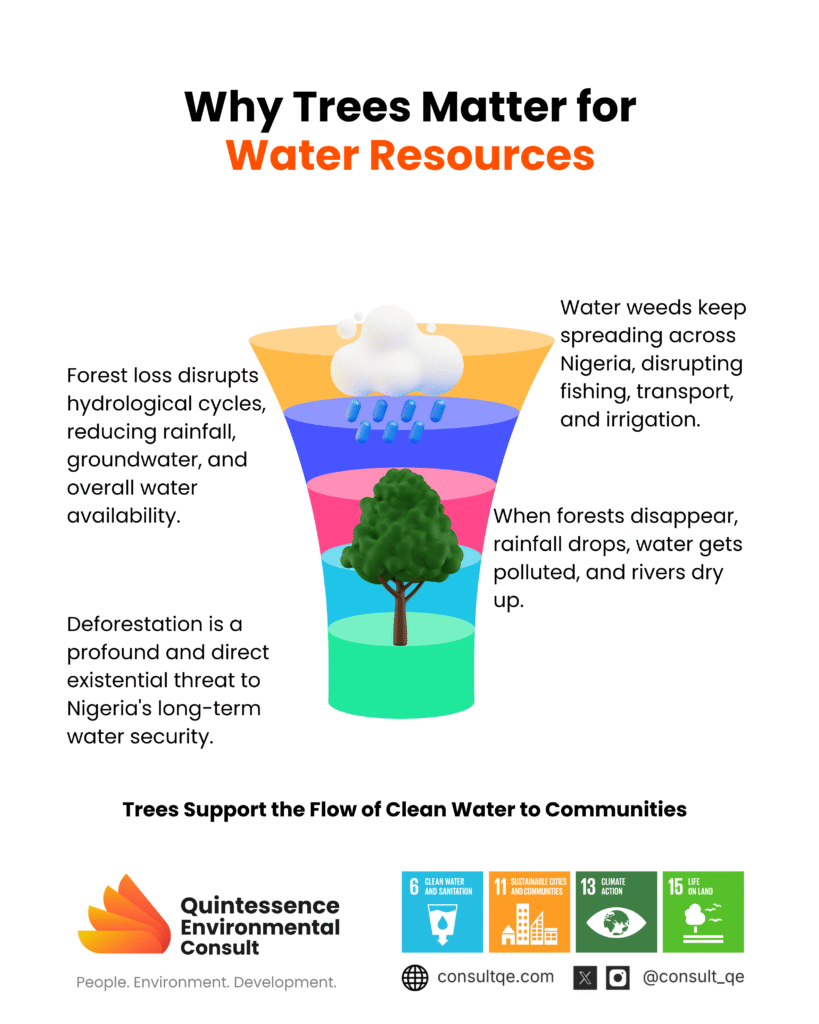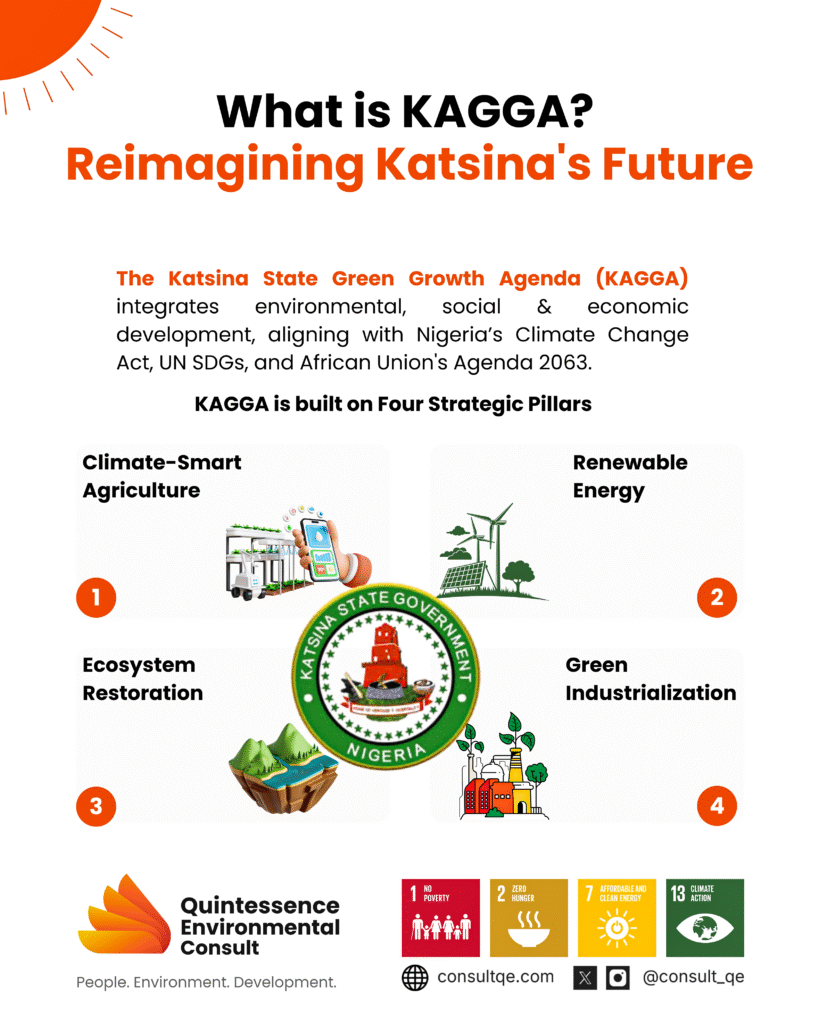Deforestation: A Critical Threat to Sustainable Water Resources

Nigeria, a nation rich in biodiversity, is facing the challenge of water scarcity. A significant, yet often underestimated, contributor to this is deforestation.
Forest ecosystems are integral in sustaining water resources by protecting river catchments, maintaining rainfall patterns, and filtering water naturally. (10) Forests significantly enhance soil moisture retention, minimizing surface runoff, storing considerable volumes of water within their canopy, and facilitating the gradual infiltration and percolation of water into the subsurface (3).
The continuous degradation and clearing of forest reserves in the country disrupts its natural hydrological processes, jeopardizing the sustainability of freshwater resources for millions (8).
Reimagining Katsina: A Green Growth Vision for All

In an era defined by the need for sustainable development, Katsina State has taken a bold and strategic step forward. The Katsina Green Growth Agenda (KAGGA) is more than just a policy document, it is a transformative vision designed to align environmental resilience with economic growth.
The global standards for WASH: Are We Meeting Them in the Federal Capital Territory’s (FCT) Primary Healthcare Facilities?

Takeaways WASH Deficiencies in FCT Healthcare Facilities: Many primary healthcare centers (PHCs) in Nigeria’s Federal Capital Territory (FCT) lack essential water, sanitation, and hygiene (WASH) services, leading to compromised infection prevention and control. Global WASH Standards: The World Health Organization’s Joint Monitoring Programme outlines service ladders for drinking water, sanitation, and handwashing facilities, ranging from “safely managed” to “open defecation,” to assess and improve WASH services. Impact on Health Outcomes: Inadequate WASH facilities in healthcare settings contribute to higher rates of healthcare-associated infections, including neonatal and maternal infections, adversely affecting patient outcomes. Initiatives for Improvement: Organizations like UNICEF and WaterAid are working to enhance WASH infrastructure in Nigerian healthcare facilities, including the FCT, through the construction of solar-powered boreholes and advocacy for better hygiene practices. Call to Action – Increased funding and coordination by relevant government agencies. INTRODUCTION Did you know that some primary healthcare facilities in the Federal Capital Territory (FCT), Nigeria, still lack access to basic water and sanitation services? Patients and healthcare workers often struggle with poor hygiene conditions, leading to increased risks of infections and disease outbreaks. With global benchmarks for Water, Sanitation, and Hygiene (WASH) being essential for quality healthcare, this blog explores whether primary healthcare facilities in Nigeria’s Federal Capital meet these basics. BACKGROUND – What is WASH? WASH stands for Water, Sanitation, and Hygiene. These components are essential for preventing infections and ensuring the health and safety of individuals in any setting—especially in healthcare facilities. Accordingly, global standards for WASH services have been defined to establish accessibility and inclusion for all. The WASH framework has evolved significantly over the past few decades. Originating in the early 1990s, the initiative was initially driven by the urgent need to combat waterborne diseases and poor sanitation. Global agencies such as the World Health Organization (WHO) and the United Nations International Children’s Emergency Fund (UNICEF) set forth comprehensive standards that focus on: Ensuring safe drinking water: Meeting quality standards through parameters like pH, turbidity, total coliform counts, E. coli, and other contaminants. Providing adequate sanitation: Including properly maintained toilets and waste management systems. Promoting effective hygiene practices: Access to handwashing facilities, sterilization protocols, proper maintenance and waste management practices. The JMP Standard For WASH Services The Joint Monitoring Programme (JMP) by WHO and UNICEF defines WASH standards using a service ladder approach to assess access to water, sanitation, and hygiene. It categorizes services into five levels: Safely Managed, Basic, Limited, Unimproved, and No Service, providing a structured framework for global monitoring. Drinking Water Sanitation Hand Washing Safely managed Safely managed Basic Basic Basic Limited Limited Limited Unimproved Unimproved No facility Surface Water Open defecation Drinking Water Safely managed Drinking water from an improved source, located on premises, available when needed, and free from contamination. Basic Drinking water from an improved source, but requiring less than 30 minutes (round trip) to collect. Limited Drinking water from an improved source, but collection time is more than 30 minutes (round trip). Unimproved Drinking water from an unprotected well or spring. Surface Water Drinking water collected directly from rivers, lakes, ponds, or streams. Sanitation Safely Managed Use of improved sanitation facilities, not shared, with safe disposal or treatment of waste. Basic Use of improved sanitation facilities, not shared with other households. Limited Use of improved sanitation facilities, but shared with other households. Unimproved Use of pit latrines without slabs, hanging latrines, or bucket latrines. Open Defecation Disposal of feces in fields, bushes, or open spaces. Hand washing Basic Handwashing facility with water and soap available at home. Limited Handwashing facility without soap or water. No Service No handwashing facility available at home. WASH services aim to provide sustainable solutions to improve living conditions, reduce poverty, and ensure universal access to water and sanitation by 2030. Beyond its direct impact on health outcomes, inadequate WASH services contribute to broader social and economic challenges. The high burden of preventable diseases due to poor WASH conditions leads to increased healthcare costs and adverse economic outcomes for communities. GLOBAL AND NIGERIA’S CASE STUDIES IN WASH IMPLEMENTATION Global Case Studies Sato Pan Introduction: Launched in Bangladesh in 2012, the Sato Pan is an innovative toilet solution designed for low-income communities. Its counterweighted trapdoor minimizes insect and odor exposure while using less than one liter per flush. By 2014, over 800,000 units had been installed, and the initiative had expanded to 45 countries, benefiting over 68 million people. WASH FIT Implementation: The Water and Sanitation for Health Facility Improvement Tool (WASH FIT) has been adopted in countries like the Philippines, Indonesia, Kenya, and Mali. This tool enhances WASH services in healthcare facilities, leading to improved patient outcomes and facility hygiene standards. Nigerian Case Studies In Nigeria, access to WASH services remains challenging. According to WASHNORM (2021), approximately 67% of the population has access to basic water supply services, but only 13% are classified as “safely managed.” There are approximately 33,000 Primary healthcare Care (PHC) facilities, but half of them lack clean water, and 88% lack basic sanitation amenities; FCT is no exception. Several organizations, including WHO, UNICEF, and local Non-governmental organizations (NGOs), are working to improve WASH facilities in Nigeria. These include: 2 1. UNICEF, in collaboration with the Nigerian government, has constructed and rehabilitated over 1,700 solar-powered boreholes across multiple states, including the FCT. Examples of these are: Benue State Uikpam IDP Camp: In November 2021, UNICEF commenced the construction of a 12,000-litre motorized solar-powered water borehole, along with two blocks of five-compartment toilets and five-compartment bathrooms, to serve approximately 27,227 Internally Displaced Persons (IDPs) in the Uikpam IDP camp, Guma Local Government Area.8 Kano State Fadisonka Community: In Fadisonka, Wudil Local Government Area, a solar-powered borehole was installed around 2013 by the Rural Water Supply and Sanitation Agency in partnership with USAID and UNICEF. This borehole serves as the primary water source for the community.9 2. Programs like the WaterAid Nigeria’s Hygiene for Health campaign have played a crucial role in promoting proper sanitation and hygiene within PHCs, contributing to improved patient safety.
Unregulated Drilling of Water Wells in Nigeria: Risks, Regulatory Challenges and Strategic Way Forward.

